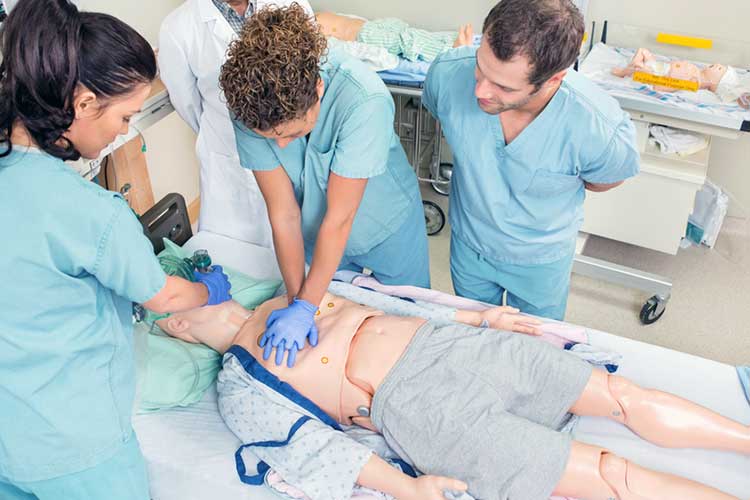The transition from student nurse to registered nurse can be fraught with many emotions ranging from happiness and excitement to fear, anxiety and uncertainty.
It’s a time when new graduates might be questioning everything - from their own abilities to whether they made the right career choice to whether they will ever be like the nurses they are now working with on their new ward.
This transition period is often described by people as a complete reality shock, and let’s face it, apart from nursing, not many other occupations come with the added risk that you could severely hurt or even kill another human being.
But fear not! Every nurse, at one point or another, has experienced these feelings.
Issues Faced by New Nurses
Some of the common issues that may occur during the transition period from student nurse to registered nurse include:
- Theory-to-practice gaps
- Caring for increasingly complex patients with multiple comorbidities
- Time management
- Medication administration
- Patient assessment skills
- Documentation skills
- Limited proficiency in managing and executing technical skills
- Working and collaborating within teams
- Accountability
- Decision-making
- Shiftwork
- Developing competency in planning and organising
- Prioritising and coping with unexpected events
- Lack of access to experienced mentors and coaches
- Performance anxiety
- Bullying
- Workload
- Limited knowledge
- Expectations from self and others
- Blame or complaint culture in the workplace.
(Chang & Daly 2012; Hofler & Thomas 2016; Kaihlanen et al. 2013; Wong et al. 2018)
What Can Graduate Nurses Bring to the Ward?
Graduate nurses can bring many benefits to the workforce.
Research has found that new nursing graduates often have considerable strengths in the following areas:
- Communication skills with patients
- Psychosocial assessment skills
- Accountability for their own practice.
(Chang & Daly 2012)
Graduates are often highly aware of the importance of their role and uphold their professional values accordingly.
They also display awareness of the different roles a nurse must play, such as being a teacher, a provider of care, a communicator, an advocate, a coordinator, a decision-maker, and also being able to suggest changes in practice (Chang & Daly 2012).

How to Help Facilitate the Transition from Student Nurse to Registered Nurse
Preceptorship Programs and Mentoring
Support is a major factor in ensuring a smooth transition period.
Preceptorship programs support graduates by allowing them to work closely with a more experienced nurse in order to develop their confidence and competence and gradually gain more autonomy in patient care.
The preceptor or mentor helps to guide the nurse in their clinical learning process, as well as their professional and personal growth.
These programs have shown to be very effective in offering support to new nurses. They may:
- Ensure more positive outcomes within the first six months of the transition
- Reduce culture shock
- Help to link theory with practice.
(Chang & Daly 2012; Hofler & Thomas 2016; Kaihlanen et al. 2013)
A Supportive Environment
A supportive environment is also a key factor in ensuring a successful transition.
Newly registered nurses should be provided with opportunities to develop their clinical and patient management skills and to see the effective outcomes of their work in practice, which should encourage further confidence in their abilities.
Being part of a supportive environment also allows new nurses to feel comfortable raising any issues or concerns during their transition period. This allows potential problems to be identified and managed early, which is essential in reducing anxiety and stress (Chang & Daly 2012).
Planning
It’s beneficial for nursing students to establish an understanding and awareness of some of the potential challenges and issues they may face during the transition period.
This will encourage students to preemptively devise strategies that will assist them in this transition before problems occur, hopefully making the adjustment a more positive experience (Chang & Daly 2012).
Self-Care
During this time of transition, graduates need to care for themselves and maintain a healthy work-life balance, as this can be a turbulent time both personally and professionally and may lead to feelings of exhaustion and anxiety.
It is critical that new nurses are made aware of the importance of a healthy work-life balance early on (Hofler & Thomas 2016).
Tips for a Positive Transition
Other strategies and factors that have been found to facilitate a positive transition from student nurse to registered nurse include:
- Adequate staffing patterns
- Open communication
- Good administration
- Leaders who are approachable and responsive
- Support when dealing with deteriorating patients, death and dying
- Orientation programs with realistic goals
- Timely provision of constructive feedback
- Appropriate guidance from senior staff
- Continuing staff development opportunities
- The availability of support and counselling for staff
- Stress-relief strategies such as exercise or meditation.
(Chang & Daly 2012)
Seeking Help
If you’re experiencing difficulties during your transition period, it’s important to seek help.
Support can come from a variety of sources, including educators, mentors, preceptors, nursing leaders, co-workers and services from outside the workplace.
Some workplaces will have access to free support and counselling services that staff can use, and organisations such as the Australian Nursing and Midwifery Federation and Nurse & Midwife Support can also provide support to individuals during this time.
Topics
Further your knowledge
References
- Chang, E & Daly, J (eds), 2012, Transitions in Nursing: Preparing for Professional Practice, 3rd edn, Elsevier, Chatswood.
- Kaihlanen, AM, Lakanmaa, RL & Salminen, L 2013, ‘The Transition From Nursing Student to Registered Nurse: The Mentor’s Possibilities to Act as a Supporter’, Nurse Education in Practice, vol. 13, no. 5, pp. 418-422, viewed 3 July 2024, https://www.sciencedirect.com/science/article/abs/pii/S1471595313000024?via%3Dihub
- Hofler, L & Thomas, K 2016, ‘Transition of New Graduate Nurses to the Workforce: Challenges and Solutions in the Changing Health Care Environment’, North Carolina Medical Journal, vol. 77, no. 2, pp. 133-136, viewed 3 July 2024, https://ncmedicaljournal.com/article/54830
- Wong, JSW, Che, WSW, Cheng, MTC & Cheung, CK 2018, ‘Challenges of Fresh Nursing Graduates During Their Transition Period’, Journal of Nursing Education and Practice, vol. 8, no. 6, viewed 3 July 2024, https://www.sciedupress.com/journal/index.php/jnep/article/view/12168
 New
New 

